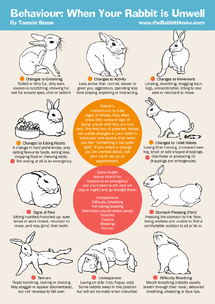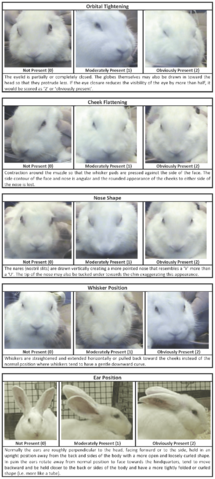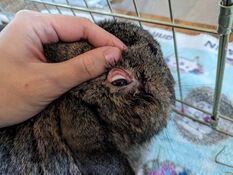Veterinary emergencies

Because rabbits are prey animals, they work very hard to hide any signs of illness. As a result, owners often cannot tell when a rabbit is sick until severe symptoms have appeared. Daily interaction with your bunny will help you realize what is normal and irregular.
Common symptoms
If your rabbit shows any of the following symptoms, make an appointment with your rabbit-savvy veterinarian as soon as possible.[1] Seemingly minor symptoms can escalate quickly and turn into major emergencies within 24 hours.


GI symptoms
- loss of appetite (anorexia) or changes in eating habits - A good way to test this is to offer an irresistible treat to your bunny such as fruit.
- small to no poop or diarrhea
- sitting in a hunched position or pressing stomach against the floor

- loud GI sounds or complete silence in the stomach - You can use a stethoscope or listen with your ear pressed against the stomach.
These symptoms are suggestive of an onset of GI stasis, often a secondary symptom to other health issues. As a result, it is important to take your rabbit to an emergency hospital if possible to rule out quickly fatal issues such as (but not limited to) bloat, liver lobe torsion, or gastric ulceration.
Respiratory and ear symptoms
- increased, shallow, and/or labored breathing (e.g. nose flaring, heaving sides, wheezing sounds) - For immediate relief, please check their nose for any external physical obstructions like dried mucus and gently clean it off. Increasing the humidity with a humidifier or giving some steam therapy can also ease any congestion.
- chest congestion
- sneezing, nasal discharge, or watery eyes; matted front paws from wiping nose
- scratching or shaking ears
These symptoms are suggestive of E. cuniculi, head tilt, heat stroke, otitis, snuffles, dental issues, or thymoma.
Urinary tract symptoms
- sudden loss of litter box habits
- dribbling of urine (urinary incontinence)
- straining to urinate; sitting in litter box for long periods of time
- urine which appears more white - suggests sludge buildup
These symptoms are suggestive of bladder sludge and stones, E. cuniculi, or urinary tract infection.
General symptoms
- fever or hypothermia - normal rabbit temperatures are 101-103°F / 38-39.6°C
- loud teeth grinding - a sign of pain, different than gentle tooth purring
- irritability or unusual aggression
- listlessness, lethargy, or lack of interest in surroundings
Extreme emergencies
If your rabbit shows any of the following symptoms, consider it an extreme emergency, and locate an emergency veterinarian immediately.[1]
- shallow breathing and/or weak heartbeat
- complete immobility or unresponsiveness
- severe diarrhea or mucous-covered stools
- complete silence in stomach - this is a sign of full stasis
- very labored breathing (e.g. head tilted up, bobbing head) - See #Respiratory and ear symptoms in the section above for additional video examples.
- convulsions or seizures
- any injury resulting in open wounds or possible broken bones - this includes any sort of attack by another animal. If your rabbit is limping or dragging limbs, please immediately put your rabbit on cage rest to prevent further damage until they can be seen by a veterinarian.
- any symptoms of shock - listlessness, limpness, or abnormal gum coloring (grayer or redder than normal).
- temperatures lower than 100°F/37.7°C or higher than 104°F/40°C (hypothermia)
- not eating for 12 hours, no poop in 12 hours, or increasingly smaller poop
- dehydration - dry tacky mucous membranes and/or delayed skin elasticity
- gray, mauve, or white mucous membrane color (e.g. check gums and eyelids) - this is a sign of severe anemia or lack of oxygen (hypoxia).
- loss of balance or head tilt
- partial or total paralysis
How to prepare for a visit to an emergency center
To assist the emergency veterinarian, it is helpful to know some things about the rabbit concerned. The following list is paraphrased from Rabbit Advocates and other sources:[2]
- A history of illness, including symptoms.
- Treatments given and any reactions.
- Baseline lab work (blood and urine) - obtainable from your regular veterinarian.
- Current normal weight.
- Complete diet including date of when new foods were started and any reactions.
- Normal food and water consumption.
- Normal urine and stool output.
- Neutering status.
- Vaccination status (if relevant).
Here are some more resources about preparing for an emergency visit.
- Kathy Smith, Planning for Emergencies
Further reading
- Dawson, B. (2011). Dealing with Medical Emergencies
- Zooh Corner. (2014). Rabbit Medical Emergencies
- Happy Hoppers Rabbit Forum. (2008). Emergencies: When Your Rabbit Needs A Vet NOW
- Lathan, L. First Aid For Rabbits
- Petfinder. Help! My rabbit is sick and I can't reach my vet!
- Paul-Murphy, J. Emergency Medicine and Critical Care for Rabbits
- Rabbit Welfare Association & Fund. (2005). Rabbit ER : When your rabbit needs to see the vet NOW
- Rabbitwise, Inc. Rabbit 911
See also
References
- ↑ 1.0 1.1 Smith, K. (2003). Rabbit Health in the 21st Century. (2nd ed.).
- ↑ Rabbit Advocates. (2000). Useful Tips for a Trip to the Emergency Center. Retrieved 07 Feb 2017 from http://rabbitadvocates.org/careinfo/packet/emer.html






